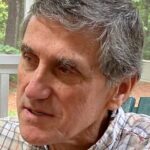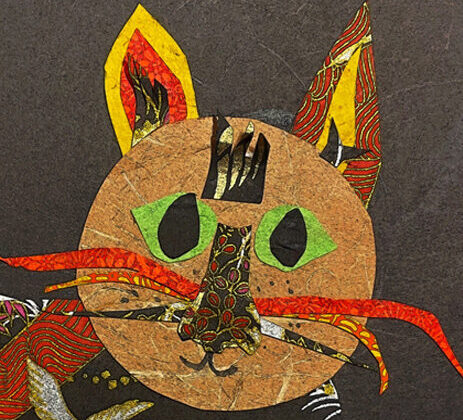Richard S. Straw
Rapiaria in a Pandemic
1. Prodigal
To watch the courses of the stars as if you revolved with them. To keep constantly in mind how the elements alter into one another. Thoughts like this wash off the mud of life below.
Still the same (almost), in spite of everything. I remember once as a teenager looking up long at the stars somewhere in the middle of nowhere where I found myself stranded while hitchhiking alone across the country. Glancing up a year later, well past dad’s curfew, but while running home slow from the Y on icy and snowy sidewalks, the stars were there still, dizzyingly still. And less than a year afterward, down and out on the outskirts of Bemidji, while I weighed the pros and cons of calling home collect for advice after failing to escape penniless into Canada, the stars were close then, too, so near I could switch them off and on with blinking wet eyes.
in a pandemic as if nothing is amiss starry night
2. Cleansing
Remember it all; erase nothing—the minutiae of thumb twiddling, finger tapping, complaints about a “thorn in the flesh,” fuzzy yet lurid-feeling dreams, one-sided talks, overheard conversations shared, kind words thought but unsaid, unpicked-up calls, ghosted messages, unanswered letters, online events attended inattentively, books read for mere enjoyment, other books read but not studied, daily tasks perfunctorily performed, half-hearted attempts to care, self-pitying glances out windows onto empty streets, irritations at disrupted weekday routines and weekend habits, persistent regret about not making pilgrimages home when relatives were alive, those fading few words from the dead who cared, Polonius-like advice offered to deaf living ears, scenes from classic movies slowly supplanting reality, all that that’s happening now.
in a pandemic pent-up confessions parked outside a church
3. Remains
Late yesterday afternoon with nothing left to do on the inside, I bent down like a penitent to pick up winter-fallen tree limbs, sticks, and large twigs scattered about the pine needles and cones covering the common area and woodlot behind our house. By sundown, I had filled two trash cans and several yard waste bags and had made a crisscrossed pile of logs 3‑feet tall, a funeral pyre ready for a match if allowed by the covenants, old or new. Alive last year, these now dead things, carefully snapped, sorted, and stacked by a cul-de-sac’s curb, wait under a streetlight for transport and burial at the city dump.
What I got for my pains was a cleared woodlot floor, stinging cuts on arms and hands, and a bloody shirt and pair of pants. Stained clothes can be washed mostly clean, of course, and a slightly damaged body, at least, should scab and heal. Trees are different. They’re self-pruners, shedding their dead and dying daily, depending on light received, tolerance to shade, nearness to neighbors. Eventually, all of my trees will collapse, as mine and most everyone’s lungs, too, will rattle in the end, at which time another collector, it is hoped, will kindly take what is left away.
in a pandemic sheltering in place redbud blooms
4. Closed for the Season
Final lights fade as rain descends like a slow curtain, and I pause to listen a while after sundown on our screened-in back porch. Invisible and faint, the rain’s leading edge drips downstage on our privacy privet and on an oak’s browned leaves over a vacated bluebird house. Tall pines crossing over and into the wings collect sweat-like drops on their bare dancer-like limbs, just as the woodlot’s fallen needles and leaves—and our thinning lawn—absorb like an ample apron the least dark droplet.
Distant traffic off left prompts a questioning bird call off right. Not a sound is heard from the house.
A jet glides like a walk-on upstage toward a landing. Then music, as if from a hidden orchestra pit, tinkles from the chimes on our neighbor’s porch. A mourning dove where cats can’t walk replies with one more lament. And like polite, scattered applause, the rainfall subsides.
So draws to an inconclusive close another dress rehearsal of the final scene of my last act after nearly seven decades of side-of-mouth asides and circular soliloquies. Into the darkness, I squint once more with crow’s feet from this now quiet stage and step out of character to bow deeply again—and again—with a willful suspension of disbelief toward that absent and silent yet ever watchful landlord, my patient, loving audience of one.
in a pandemic cardinals test a birdbath
5. The People, Well
The city park where my wife and I stroll almost every day, usually in the late afternoon at suppertime when it’s less crowded and cooler, is fairly well maintained, but not manicured, so to speak. When a storm recently knocked an oak flat across part of the park’s blacktop-surfaced walkway encircling the roiled lake, for instance, a city work crew came out the very next fair-weather day in an off-road work buggy. They carefully chain-dragged the oak’s trunk and amputated branches a little off to the side of the walkway, and there its remains decompose neatly for all passersby to see alongside thick parallel tread marks in the drying mud.
It’s a clean city park, too, for the most part. Because of my back, though, I stoop along rather than saunter, and I can’t help but notice, with my head-down gaze, candy and gum wrappers and tissues dropped among weeds, bluets, and honeysuckle, as well as an occasional pile of unbagged dog poop, stray cracked plastic Easter egg shells from a recent “hunt,” and dark-leaved poison ivy inching boldly toward the walkway. Poison ivy perhaps crisscrosses the park’s various shortcut paths, but we never venture on those—too slippery on their muddy stones after a rain and too many tree roots and possibly copperheads impersonating tree roots.
Despite these conditions, we try to remain, as Walt Whitman advises, “me imperturbe.” We just shuffle along down the paved walkway headfirst into the cooling, soothing breeze. Of course, we sometimes must move over obligingly into snaky weeds for large, loving, intergenerational families marching two or three or more abreast. And we subtly step aside to avoid bumping into arm-in-arm sweethearts who don’t wear masks and notice nothing ahead of them, only themselves. We must pause momentarily, too, if only out of personal interest, for worm-baited hooks to be cast wildly backward from new spin-cast rods and reels a few paces away. We’ve managed to artfully dodge sweating runners and power walkers who huff and puff and spit near us as they use the park as a replacement for their closed gyms. So far, we’ve also avoided run-ins with bicyclists and skateboarders of all ages who swoosh past us without warning. And, of course, we try to maintain the 6-feet distance (at least) from that fat pair of waddling Canadian geese who might attack us should I presume to take their photo.
Masked, nearly incognito, but not incognizant, we bypass all and are passed by all in turn, gingerly, quietly, respectfully, safely (it is hoped), “at ease in Nature,” as good old Walt suggests, to finish circling the lake’s wind-swept waves on another of our 2-mile constitutionals.
in a pandemic storm clouds quickening our pace far from shelter
6. Bubble
Silence is the space around every act and every human relationship. Friendship needs no words—it is a solitude freed from the anguish of solitude.
Friendly human silence extends to animals, especially house pets, of course, and perhaps even to our relationship with God. Our speechless but alert cats and dogs need no words—it goes without saying, you might say. They need only us, mostly our caring eyes, open hands (with food), and warm laps. An unseen, inaudible, impalpable, yet personal presence, I’ve read, may also be sitting right beside us when we find ourselves alone, however, producing perhaps the warm silence one old penniless itinerant called “the peace of God, which passes all understanding.”
Furtive silence that festers after a ghost story is read and dropped onto a night stand or lingers when the evening news is clicked off is not what the quietest people hear, those recollected ones who perceive more acutely “sighs too deep for words,” according to the same old traveler, through daily practice or, by necessity, in response to an unexpected and unwanted crisis, at a private frontier on a hospital gurney, in extremis, when shorebirds faintly call.
in a pandemic opening sick room blinds to let in day
Notes:
As mentioned in a note for “Extracts from Rapiaria,” published in Haibun Today, Volume 13, Number 1, March 2019, the word “rapiaria” is Latin for “spiritual scrapbooks,” which were often kept by members of the Modern Devotion, including Thomas à Kempis, who is thought to have compiled his Imitation of Christ from a series of such notebooks. This “Rapiaria in a Pandemic” sequence is a continuation of “Extracts from Rapiaria.”
The title of #1 alludes not only to Jesus’ parable of the prodigal son (Luke 15:11-32), but also to the word’s explicit denotations and various connotations (https://www.merriam-webster.com/dictionary/prodigal). The epigraph is from Marcus Aurelius’ Meditations, translated by Gregory Hays (New York, NY: Modern Library, 2001, Book 6.47, p. 92).
The “thorn in the flesh” phrase in #2 comes from the King James Version, 2 Corinthians 12:7.
For further information besides what’s provided in #3 about the life of trees, see Michael Snyder’s March 2, 2015, article, “Woods Whys: Self-Pruning Branches,” in Northern Woodlands (Spring 2015).
The title of #5 is a variation of the title of Carl Sandburg’s book-length poem, The People, Yes (New York, NY: Harcourt, 1936). The “me imperturbe” and “at ease in Nature” text quotations are from the “Me Imperturbe” poem in “Inscriptions” within Leaves of Grass (1891-92) (New York, NY: Library of America, 1982, p. 173) that “is remindful of the counsels to himself that WW often entered in his notebooks,” according to Michael Moon, Sculley Bradley, and Harold W. Blodgett, editors of Leaves of Grass and Other Writings (New York, NY: W. W. Norton, 2002, p. 11).
The epigraph for #6 is by Dag Hammarskjöld and was translated by Bernhard Erling in the following book, which is available from the Dag Hammarskjöld Foundation, Uppsala, Sweden, as a free PDF download: A Reader’s Guide to Dag Hammarskjöld’s Waymarks (St. Peter, MN: Author, 2005, 1925–1930, #10, p. 4). The two Bible quotations in #6 are from the Revised Standard Version, available at https://quod.lib.umich.edu/r/rsv/browse.html. The first leads off Philippians 4:7, “And the peace of God, which passes all understanding, will keep your hearts and your minds in Christ Jesus.” The second ends Romans 8:26, “Likewise the Spirit helps us in our weakness; for we do not know how to pray as we ought, but the Spirit himself intercedes for us with sighs too deep for words.”
About the Author

Richard S. Straw is from Ohio and currently lives in North Carolina with his wife, Isobel. His collection, The Longest Time: Haibun & Essays (2009, revised 2019), is available through The Haiku Foundation’s digital library.

in a pandemic
silence heard at last
behind all these words
yes, the beautiful silence
nothing more
still